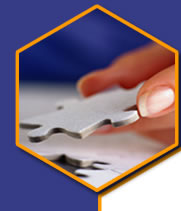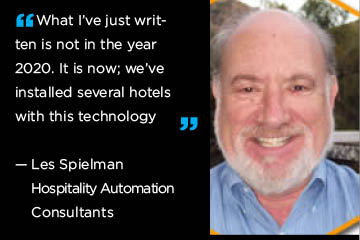




How Smart Devices Will Change Hotel Technology |
By Les Spielman
Some Mind-Blowing Applications Are on the Horizon
Over the past 25-plus years of attending the Consumer Electronics Show, I've witnessed the birth, and quick demise of many new technology innovations. One item I recall fondly was the first showing of an item called Bluetooth. I was so struck by the possibilities of this new technology that I spent most of CES at the Ericsson booth. I could easily see its various uses beyond mobile phones. I was lucky enough to get in touch with my stockbroker and bought a lot of Ericsson stock. The rest is history.
The reason for this recollection is even though we were only at CES looking for what we could use in the hospitality industry, we became aware of how many more technologies have cross-platform uses.
As example, several years ago we spotted a new product alliance group that specializes in another type of wireless technology called ZigBee. This opened a new era in wireless technology that crosses all boundaries. I first used ZigBee about three years ago. Today, you will find it in many enterprise applications and even more by cable content providers. Cable companies such as Comcast are converting set-top boxes and remotes to RF wireless to form the next generation of home networking that can control security, energy, health monitoring, home entertainment and other environmental systems.
Because ZigBee uses 2.4 GHz, it can penetrate walls, cabinets, furniture, floors and even humans. Other benefits include the future elimination of batteries for remote control devices, plus a broader broadcast range and a "find" button that will make the remote beep so it can't get lost as easily.

ZigBee technology is just one new piece of a giant puzzle. Imagine you're on a business trip and you have your WiFi device(s) of choice with you. You log onto your home security system and notice your garage door is open. With just one touch on your WiFi device you can close that door. The new security systems for both home and businesses will have video cameras activated by you or if something trips the system. Wait a minute. The same system will be monitoring your thermostat, burglar alarm, lights and any room in your house. You will be alerted to unusual activity anywhere in your home. It will be able to phone the police, fire department or paramedics. It makes no difference where in the world you are, as long as you have Internet connectivity, you have control over everything.
In the hospitality industry, Near Field Communications now has an even more secure network that assists the utilization of total hotel security, individual room monitoring for the HVAC system, more bedside controls for lights, electronic drapes, monitoring who's at the door, fire and smoke security, excessive electrical usage, all centrally monitored by management and the individual guest, from network-controlled smart devices we all carry.
Smart Check-In
Imagine a typical hotel (which already
exists today). Your smart device is already registered with the hotel or
hotel chain. You walk into the front door of the hotel and there are sensors
by the entrance/exit. You press the hotel's app on your mobile device;
you've now checked into the hotel without going to the front desk. The
hotel's system sends your smart device an arrival confirmation along your
room number.
When you reach your room, the app opens the door using NFC. Look ma, no keys needed. The door security device registers your arrival time along with the device's ID info. In the meantime, the HVAC system now sets the temperature of your assigned room to the temperature from your profile. Housekeeping and the concierge are notified. Your profile's request for beverages, fruit, etc. are in the process of being delivered. The special bedding, bathrobe, etc. arrives. The HDTV set has been turned on to your favorite channel and all of the TV channels have been changed to the lineup of your specifications. You touch a low-voltage switch and the shower/bath is set to run the water at your pre-requested temperature. But you change your mind because the hotel's spa has sent a message to your HDTV, or the room's IP phone, or your smart device that they're running a special on a massage of your choice. Your same smartphone/device accepts the invitation for a one-hour massage. The spa is immediately notified and the proper attendants are sent to their station. At the same time, a message has been sent to the shower/bathtub to stop the water.
What you may not realize is the spa had a lull of business and had scheduled for the sale to begin when the bookings at the spa had reached a preset number of vacant time. No human intervention was needed. The system just "pushed” the message out via the IP-enabled HDTV, the IP-enabled room phone and all IP-enabled smartphones in the property.
You finish your massage and go back to your room with your smartphone, which is now your key, charge card, ID, etc. for the hotel, and you dress for dinner. You made the dinner reservation, from either the hotel IP phone, interactive HDTV or your smart device.
Time For Dinner
Upon your arrival at the restaurant
you're handed an interactive tablet, like an iPad. The hotel had just
switched all of its tablets to the dinner menu from the lunch menu in one
fell swoop from a master terminal. Oh yes, they also adjusted some pricing
on several items due to today's market conditions. The season has also just
changed; therefore, the menu now reflects the tone of the new season. The
restaurant incurs no printing charges and is assured all prices and menus
are correct from their master terminal. If you want to see what the meal
will look like, you simply tap the tablet and drill down to the desired
level. You can see the actual colors and side dishes of each menu item,
i.e., if you ordered meat, making sure that the restaurant's idea of medium
rare is the same as yours. (No worries vegans, we have you covered, too.)
You can choose all of the modifiers that you wish. If you want to see the
current night's specials, you tap the appropriate icon. Instead of giving
the order verbally to the server, you click on the items you've chosen and
everything is sent directly to each preparation section, along with your
table number, table position, name, and verified room number. You can always
change it to a cash sale through the tablet.
As you are waiting for your food, you're so enthralled with all of this you must Twitter and post on Facebook, as a Facebook and twitter icon was pushed to the tablets. Of course, you just made this hotel and restaurant friends, and you are sharing all of this fantastic food and attention with all of your friends and business associates. The hotel awards you points for sharing your experience and since you are now a friend on Facebook, you get a special desert or a percentage off your next meal at that restaurant.
What I have just written is not in the year 2020. It is now. In the past two years we've installed several five-star hotels with all this technology, with several more already on the books.
What About the Future?
The following is an item I saw
that really intrigued me. Right now I cannot find a straight hospitality area
in which it would fit, so I'm just throwing it out for all of the readers to
think about it and start your thought processes working.
What are your thoughts about computer mice? No, not the ones that may have crawled into your system, but the ones you navigate with. Boy, do I have a surprise for you. Imagine a web page or Word document on the screen before you, and the page scrolls automatically, smoothly and effortlessly as you proceed through the article. The system knows where your eyes are and how fast you're going, so it keeps your place centered on the screen, scrolling automatically as you go, even if you jump back to reread something. This is how reading on a computer screen was always meant to be. There is no need to use your mouse as it is no longer connected to your computer.
Computer eye tracking is not new. It's available in the military, in specialized industries, for disabled people, etc., but these systems cost millions of dollars. To have it on your laptop is just fantastic.
The task of training the system is quite easy and fast. All it takes is a 10-second calibration process. You look at a dot on the screen as it moves around, the laptop's video camera follows your eyes, and the software takes it from there. That's it. I witnessed this at CES. I was totally blown away by a company called Tobii. The demo that really rocked my boat was the Google Earth demo. The software automatically focuses and zooms to wherever you are staring, which is a very weird and exciting experience.
Want to click on something, no problem. In an architecture-design program, you could effortlessly move around a large blueprint with your eyes. Want to zoom in at any point, just stare at the area, just like Google Earth. (For the disabled, Tobii makes a kit that lets you click the mouse by blinking or staring, but the system really works best in conjunction with a regular track pad or mouse.)
Tobii is not a new company. It is quite a large Swedish company that's been around for some time, and does have several other Swedish companies nipping at its heels. Are you wondering why I put this in this article? Simple, I want to stimulate your creative juices. The other technologies discussed here are already used in hospitality. This one is currently at the multi-million-dollar range but has been programmed to work with older laptop computers at an affordable price. Think of what this technology will mean for your industry.
Les Spielman is president of Hospitality Automation Consultants Ltd., an independent consulting firm. With more than 32 years of experience in the lodging business, he provides assistance with automation tasks on a personalized basis. Hospitality Automation Consultants Ltd. has successfully completed over 3,200 consulting projects throughout the world. He was just reelected to his third consecutive term to the Board of Directors of the Society of Telecommunications Consultants. His practice is global. Spielman welcomes inquiries at:
Hospitality Automation Consultants Ltd
Valley Village, CA 91607
phone: (818) 763-4449
Send
e-mail to HACL
| return home • services • our people • what's new • articles • profile • code of ethics • contact HACL |
